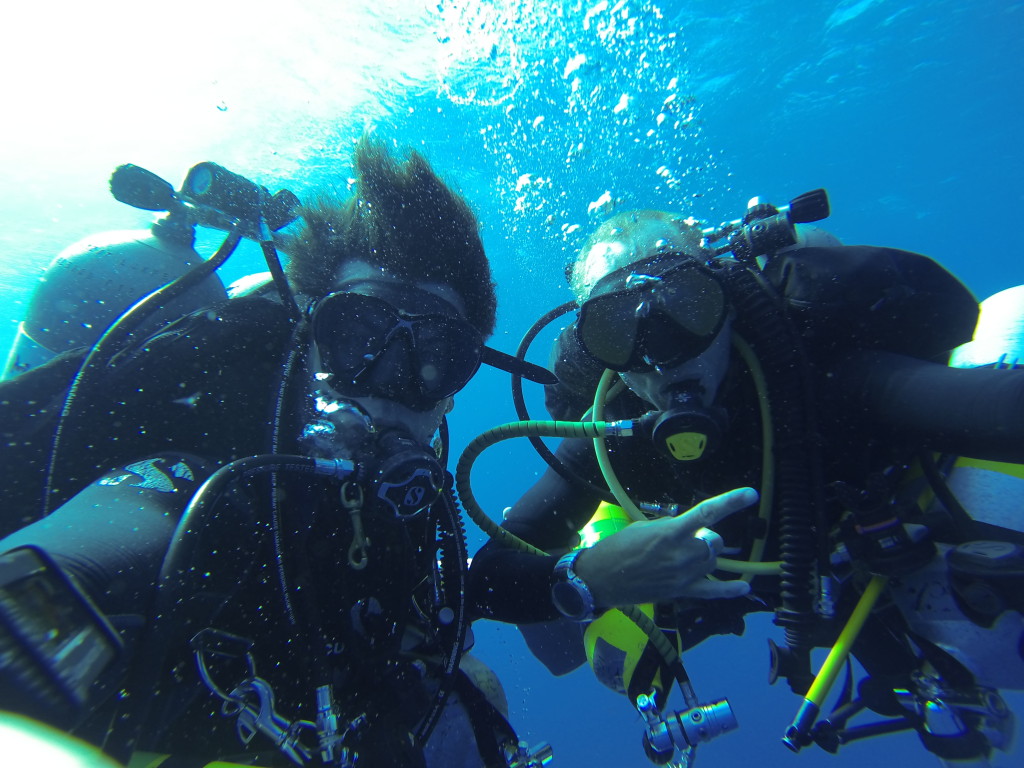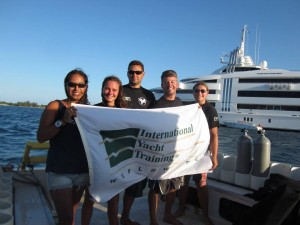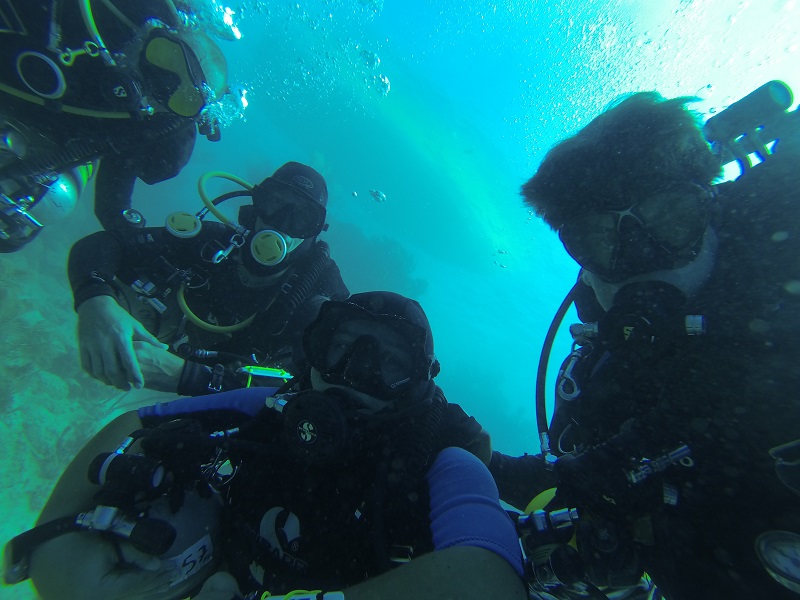All dive professionals began as recreational divers, and, just like many of you, wondered what was out there in terms of scuba diving careers. Wanting to turn a passion into a career was the catalyst for many dive professionals who’ve joined the dive industry. Many of our guests on Utila can relate to the desire to wish away their current jobs and are secretly (or even openly) envious of the dive guides and instructors who get to dive for a living. Underneath the glamour of working in exotic locations, diving most days, interacting with excited clients, and interacting with marine life, there are of course also drawbacks — long days, low pay, ear infections, minimal benefits, difficult guests and possibly a transient lifestyle. Perhaps you’ve considered the pros and cons but are unsure if you’d like to take on the responsibilities of a dive guide or instructor.
Scuba Diving Careers
For non-professionals, the first step is usually to qualify as a dive professional, which could be the rating most agencies refer to as a divemaster or dive leader. Ideally your next qualification would be as an instructor, even if you don’t wish to teach, in order to gain experience. PADI and SSI are the world’s largest training agencies, and both offer career training and pro packages for these ratings. As a PADI Course Director and Training Director for the Utila Dive Center in Utila, Bay Islands, Honduras, I’ve been fortunate to help thousands of instructors develop career paths in and around the recreational scuba-diving industry and the following are some of the areas in which many of them have chosen to specialize.
Manage a dive center or resort
Organized, multi-faceted, punctual, versatile, problem solver, analytical, customer- service oriented, team player — these are all attributes that many individuals possess from non-diving backgrounds, which transfer easily into the dive industry. Many scuba instructors soon find, once they have gained dive-industry experience, that they naturally make good managers and team leaders. Some of the benefits of managing dive centers and resorts can include on-site accommodation and meals, higher salary, travel opportunities to dive shows, and additional training in boat handling, sales, compressor repair etc. Due to the long hours and on-call nature of working in dive resorts, this role is often ideal for couples, as they are able to complement and support each other and can demonstrate stability.
Become a photo or video pro
Who doesn’t love seeing great photos of fish, manta rays, turtles, whale sharks, corals and wrecks, or videos of dive sites and aquatic life? With the boom in social media and the web in the last 10 years we now have more access to content than ever before. Ten years ago the equipment required for professional quality images and video would probably have required most divers to sell off a kidney or take out a small loan, and was reserved for professional film and documentary makers. But technological advances mean it’s easier than ever for divers to get their hands on affordable, high-quality photo and video gear. Although it’s not necessary to become a dive professional to excel in this field, you’ll usually find that working as a dive professional gives you the hundreds of hours needed in the water to build the fundamentals of becoming a good photo/video pro — excellent buoyancy control, an eye to identify and observe aquatic life and behavior, unobtrusive dive etiquette, good air consumption and heightened self- and environmental awareness.
Professional photographers and videographers also often work on assignments for media in exotic locations, or film divers and students who want a souvenir from their dive vacation. They also help develop promotional and marketing videos and images for dive centers and resorts worldwide, run classes and workshops for budding photographers and get to advance their own skills and knowledge while building their resume in a career they love.
Pursue a tec diving career
If I were to ask you what percentage of recreational divers are also trained and certified as technical divers, what would be your guess? According to industry data from PADI, it’s only around 1 percent. While technical diving is, and probably always will be, a niche activity compared to mainstream recreational diving, it has grown in popularity in recent years as the agencies have developed training programs to help make technical diving safer. Equipment has also evolved in terms of reliability, with advances in technology for mixed-gas dive computers for open-circuit trimix diving, and closed-circuit rebreathers that allow safer, deeper decompression diving. Wrecks like the Andrea Doria, Empress of Ireland, or sites like the Blue Holes of Belize and Dahab, historical WWII graveyards like Chuuk Lagoon in Micronesia and Scapa Flow in Scotland, once off-limits to most divers, are now accessible with the right training, equipment and discipline. This has created a demand for technical-diving instructors and guides. Like photography and videography, technical diving is equipment intensive and requires advanced training, but the added costs, time and challenges to qualify as a technical diver and then as an instructor open up more opportunity for employment. Qualify as a technical diver and build experience toward becoming an instructor with training from agencies such as PADI, TDI, IANTD, RAID and SSI, and pursue internship programs available in such destinations as Utila, Dahab and Florida, all with great sites and conditions for developing technical diving skills.
Work on a liveaboard or super-yacht
With 70 percent of the planet’s surface covered by water, liveaboards and super-yachts are great places to gain access to sites not normally accessible from land-based operations. In addition to a qualification as a divemaster or instructor, most liveaboard/yachting positions may also require an additional qualification, such as the STCW95 (safety and firefighting at sea), deckhand training, boat handling certificates/experience and VHF radio training. Aside from traveling to remote destinations, working on a liveaboard or super-yacht includes accommodation and meals, so it’s a great way to save money, and these positions always allow career advancement for dive professionals. Over the years we’ve trained PADI Instructors who then worked on liveaboard vessels. After building up their sea-time and experience as crew, they quickly climbed the ranks to first mate and captain, earning commercial licenses and qualifications along with lucrative salaries. Other instructors we have trained have worked on super-yachts and received additional training as a staff benefit in areas such as videography, hyperbaric chamber operation, RYA (Royal Yachting Association) qualifications and officer training. As well as also receiving good salaries, other perks of this job include traveling the world, access to state-of-the-art dive toys, paid leave and good stretches of time off. These positions do require surrendering much of your personal life while being on call 24/7 and living in close quarters with your work colleagues, but when I see Facebook updates from an instructor who qualified with us several years ago, who has now been trained to pilot a super-yacht’s submarine, I’d say it’s worth considering this career path. PADI Divemasters and Instructors looking to enter this industry should consider additional training from the RYA or IYT (International Yacht Training), as well as gaining boat handing/driving experience.
Become an instructor trainer
For scuba instructors who love the teaching side of the profession, particularly at the professional level, and who enjoy mentoring divemaster candidates and future instructors, a natural progression is to become an instructor trainer. Once a scuba instructor has acquired a minimal level of experience, recognized by their respective agency, they are usually eligible to take further training that qualifies them to train assistant instructors and assist on instructor courses before becoming an instructor trainer. Within the PADI system of diver education, all entry-level Instructors qualify with the rating of Open-Water Scuba Instructor, and can immediately enroll in specialty Instructor courses. Once they have issued 25 student certifications and have five specialty Instructor ratings, they can apply for the Master Scuba-Diver Trainer rating, which is a pre-requisite for taking the IDC Staff Instructor course. This allows them to train PADI Assistant Instructors and help on Instructor Development Courses under the supervision of a PADI Course Director. After qualifying as an IDC Staff Instructor, the next step is Master Instructor, a rating based on experience and a pre-requisite to applying to PADI to attend the Course Director Training Course. This final step qualifies Master Instructors as PADI Course Directors, who can offer the entire PADI system of diver education and conduct Instructor-level training, as well as train future IDC Staff Instructors.
If you are considering a career as a scuba instructor, various agencies such as PADI, SSI, NAUI, SDI/TDI and RAID all have different educational systems that may be more suitable for you, so do your research and look for a facility and instructors who have a wealth of experience in training, and who can support you beyond your initial course in specialized areas such as tec rebreather, yacht training and photo/video. You’ll find the possibilities for scuba diving careers are endless.




